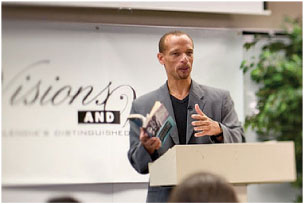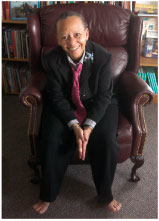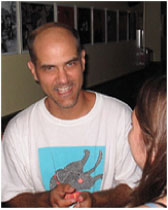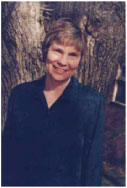
| Tech rights the fine arts by Juliet Crichton |
|
|
Virginia Agricultural and Mechanical College conferred its first graduate degree, an M.S. in bacteriology, in 1891. Sixteen years later, the newly named Virginia Agricultural and Mechanical College and Polytechnic Institute established its first graduate department, enrolling 13 students.
To say that graduate education at Virginia Tech has come a long way is an understatement indeed. These days, the university offers 120 graduate degrees and Ph.D. programs, as well as a wealth of certificates, in an ever-expanding number of disciplines. With more than 1,800 faculty members involved in graduate education, along with approximately 6,000 graduate students, Virginia Tech, one would suspect, has a graduate degree program for nearly every interest.
But just where do the fine arts fit in at a top 50 research institution that diligently enacts its land-grant missions of instruction, research, and solving the problems of society through public service and outreach activities?
|
|
MASTERING THE FINE ARTS
In academe, the master of fine arts (M.F.A.) degree is considered a terminal degree, meaning that its holder, a practicing "artist," has the appropriate credentials and "field" experience to teach at the college level. According to the Association of Writers & Writing Programs (AWP)--established in 1967 to support writers in higher education--the M.F.A. in creative writing is the equivalent of the Ph.D. in literature, linguistics, or composition, preparing students for careers as both writers and professors.
For many years, despite the M.F.A.'s burgeoning popularity and credibility, the only M.F.A. degree programs at Tech were offered in the Department of Theatre Arts. There, graduate students aiming for careers in the performance arts and higher education could study and practice such specialties as stage lighting and costume design.
Now, aspiring writers are going to get their turn.
This fall, the Department of English will welcome the inaugural class of graduate students into its new M.F.A. program in creative writing, a move that positions the university as the sole public institution in Southwest Virginia offering the degree.
Although the department already has a strong and productive group of talented novelists, poets, and playwrights in its teaching ranks, putting the new degree program into place didn't happen overnight. As is the case with establishing any new program of study, launching the M.F.A. in creative writing required not only extensive planning, but also approval from the College of Liberal Arts and Human Sciences, the Virginia Tech Board of Visitors, and the State Council of Higher Education for Virginia.
Leading the charge was Department of English Chair and Alumni Distinguished Professor Lucinda Roy, a poet and novelist, who notes that "word of the program's unique features, its service-learning component, collaboration with theatre arts, and online hypertext journal resulted in more than 150 inquiries from people wishing to apply to the program. Indeed, faculty at several undergraduate programs around the country have pledged to send us their best students. We anticipate that the program will be nationally ranked within five years and will result in the creation of one of the most exciting artistic communities in this region."
And therein is where the fine arts fit at a top 50 research institution--to which we say, "Write on."
IT'S HARDER THAN YOU THINK
Completion of an M.F.A. program, whatever the specialization, takes commitment, talent, and plain old hard work. The creative writing degree--an intense synergy of writing workshops and academic courses--is not for the faint of heart, and gaining admission entails much more than simply proclaiming that you've always wanted to write.
Established by the AWP and peer institutions, the criteria for admission to Tech's M.F.A. program include the standard assessments demanded by any program of graduate study--with a few twists. For starters, students must submit their academic record and Graduate Record Exam scores, including the English Subject Test, as well as three letters of recommendation and a list of publications, awards, and professional record.
Regardless of an applicant's glowing academic achievement, however, acceptance is primarily contingent upon the quality of a substantial sample of creative writing: a 25-page portfolio of original fiction (stories or novel excerpts); an original one-act play or excerpts from an original full-length play; or an original 15-page portfolio of poems.
Skill and effort notwithstanding, creative writing students are by necessity ever mindful of the fact that an M.F.A.--in any discipline--in and of itself cannot guarantee a job in quite the same manner that other graduate degrees may. In many ways, then, the M.F.A. is the consummate artistic endeavor, a genuine labor of love and leap of faith.
In light of its strenuous admission standards and tenuous employment opportunities, what, you may wonder, is to be gained by pursuing an M.F.A. in creative writing? Simply put, the guidance and support of professional, practicing writers.
"One of the extraordinary benefits of the M.F.A.," says English Professor Ed Falco, a fiction writer and playwright, "is that it allows students an extended period of time to develop their voice while living in a community of writers that includes several accomplished poets and fiction writers who are there to help them along their way as writers. It used to be that young writers left the country for a few years and went to Paris or somewhere exotic to live the life of a writer, subsisting on bread and water. Nowadays, young writers go to M.F.A. programs, where they learn more and eat better."
THE PROGRAM
M.F.A. students must complete 48 graduate credit hours--comprised of writing workshops and courses in literature, form and theory, digital and professional writing, professional development, and pedagogy--along with six thesis hours. The thesis, a manuscript of publishable-quality original writing in the student's genre of choice, is perhaps the most crucial requirement of the degree.
"Our M.F.A. in creative writing," Roy says, "focuses on textual production, placing special emphasis on a broad acquaintance with the literary tradition and a mastery of new forms of writing, as well as calling on students to focus on and publish in a single literary genre."
Tech's program has some great perks, not the least of which, Roy points out, is access to the university's "exceptional professional communication and technical resources and faculty expertise in the digital arena." Moreover, Roy says, "Many of the students in the program will serve as writers-in-residence in area K-12 schools"--an innovative example of service-learning--"and we hope to establish exchange programs that will enable student writers from the U.K. to trade places with our students." Finally, in collaboration with faculty and students in the M.F.A. in theatre arts program, students will have their original plays produced, providing Tech's promising artists a presence--and a much-needed voice--on campus.
"Writers are essential to the health of a community," Roy says. "Their insights and discoveries help others understand their own experiences and value the perspectives of others. Students in every discipline are eager to express themselves through writing, and the program will provide the artistic balance Virginia Tech needs."
For more information about the program, send an e-mail to creativewriting@vt.edu, call Lynn Robinson at 540/231-6501, or visit http://www.english.vt.edu/cw/mfa/index.htm.
|
| THE WRITERS
Serious student writers typically choose an M.F.A. program based on the writers with whom they wish to work--and Virginia Tech has some of the best.
 |
Professor of English and Co-Director of Creative Writing Fred D'Aguiar came to Tech from the University of Miami, where he directed the M.F.A. program. Born in London to Guyanese parents, D'Aguiar, a former psychiatric nurse and fellow at Cambridge University, has published five poetry collections, four novels, a play, several essays, and a film script. Among his many awards, D'Aguiar received the David Higham Prize for Fiction, the Whitbread Prize for Best First Novel, and the Guyana Prize for First Novel for The Longest Memory. "Teaching helps me to put into words what I think is happening during that partly mysterious, partly laborious process of writing," D'Aguiar says. "I always respond as a reader to my work and the work of other writers; that is, most of the time I don't know what will come next. Teaching poetry and fiction helps me to account for some of the ways I read as a writer and write as a reader." |
| Professor of English Ed Falco has three books forthcoming this year: the short story collections, In the Park of Culture and Sabbath Night in the Church of the Piranha: New and Selected Stories, and a novel, Wolf Point. His other publications include two short story collections, a novel, a hypertext novel, a hypertext poetry collection, a chapbook of prose poems, and several plays. Editor of The New River, an online journal of digital writing, Falco has won numerous awards, including two Virginia Commission for the Arts Fellowships, and his fiction has appeared in such journals as The Atlantic Monthly and Best American Short Stories. "Young writers need someone to believe in them," Falco says, "but they also need good, honest criticism, the kind of criticism that can help them see the strengths and weaknesses of their writing. Someone who can give you good criticism while also encouraging you to write is an invaluable resource for any writer." |
|
 |
Among the most popular and influential writers, commentators, and activists of our time is University Distinguished Professor Nikki Giovanni. At Tech since 1987, Giovanni, whose work came to prominence during the civil rights, Black Power, and black arts movements of the 1960s, has written more than two dozen books--including poetry, children's stories, and essays--and has recorded nine compilations, one of which, The Nikki Giovanni Poetry Collection, was nominated for a 2003 Grammy Award. The recipient of 22 honorary doctorates, three NAACP Image Awards for Literature, the inaugural Rosa Parks Woman of Courage Award, and "Woman of the Year" awards from Ebony, Mademoiselle, Essence, and Ladies Home Journal, Giovanni has been recognized by McDonald's--which will present its Literary Achievement: Poetry Award in her name in perpetuity--and Starbuck's, whose coffee cups feature one of her poems as part of its "The Way I See It" program. Tirelessly dedicated to giving voice to the African-American community, Giovanni has received certificates of appreciation and commendation from, among others, the U.S. Senate, the Virginia Department of Correctional Education, and the City of Los Angeles. |
| A former automotive die designer and a computer systems administrator, Assistant Professor of English Bob Hicok began writing in order to perform at poetry slams. The recipient of a National Endowment for the Arts Fellowship, Hicok, who has been called one of the best poets of his generation, has published four books and a chapbook. His first book, The Legend of Light, won the University of Wisconsin's Felix Pollak Prize and was named a Notable Book of the Year by the American Library Association’s Booklist, and his second, Animal Soul, was a finalist for the National Book Critics Circle Award. "A work ethic is incredibly important to people in the arts, and yet we tend not to think of it that way. Particularly poets. We are so much taken with this idea of inspiration. Many of us don't get used to the idea that we have to make these things happen, that they are acts of will." |
 |
 |
Assistant Professor Jeff Mann has published three award-winning poetry chapbooks, a poetry collection, an essay collection, and a novella. Forthcoming are a book of poetry, On the Tongue; a book of memoir and poetry, Loving Mountains, Loving Men; and a book of short fiction, A History of Barbed Wire. Mann's work has appeared in such journals as Wild Sweet Notes: Fifty Years of West Virginia Poetry 1950-1999, Prairie Schooner, Shenandoah, The Hampden-Sydney Poetry Review, and Harrington Gay Men's Fiction Quarterly. "The benefits of the M.F.A. program are to work with experienced writers, to focus for several years on your own work--very hard to do in other contexts--to receive constructive criticism in workshop settings, to meet other students who share your passions for reading and writing, to be exposed to fine published work, to make connections that might help your career in the future, and to discover the ways in which the world of publishing operates." |
| Alumni Distinguished Professor Lucinda Roy--the first woman and the first person of color to be chosen for this endowed chair at Tech--has a long record of service to the university. The associate dean for curriculum, outreach, and diversity for the College of Liberal Arts and Sciences from 1993 to 1996, Roy co-founded Tech's Service-Learning program and initiated several technology-based programs. The author of two novels, including the 1998 Barnes and Noble "Discover Great Writers" selection Lady Moses, and two poetry collections, Roy is at work on a book of poems, a novel, a play with Fred D'Aguiar, a children's story, and a novel for young adults. "When I began writing fiction, I was a poet," says Roy. "When I finished Lady Moses, I'd like to think I was a novelist. But the journey in between was hell. Poetry is so very different from fiction that the skills I had as a poet didn’t really help when I started writing a novel. I had to shed some of my poetic sensibilities and had to think like a storyteller." |
 |
 |
Associate Professor Katherine Soniat's books of poetry are The Firesetter, Alluvial, Cracking Eggs, Notes of Departure, the chapbook Winter Toys, and A Shared Life, which received the University of Iowa Press's Iowa Poetry Prize and a Virginia Prize for Poetry. The recipient of two Virginia Commission for the Arts Fellowships, the William Faulkner Prize, the Camden Poetry Prize, a Jane Kenyon Prize for Poetry, and an Ann Stanford Prize, Soniat's poetry has appeared in such journals as The Nation, The New Republic, Harvard Review, The Kenyon Review, The Virginia Quarterly Review, and The Southern Review. |
|
|